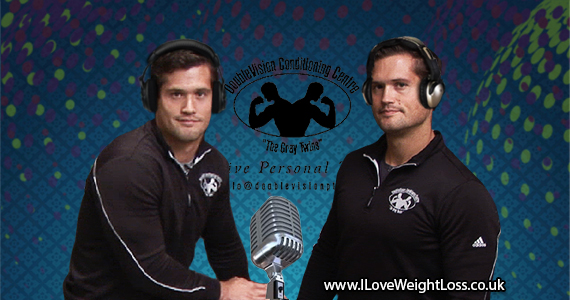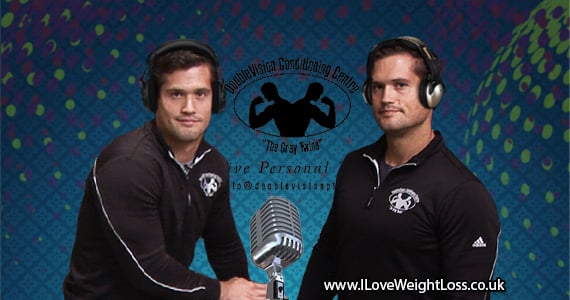
Throughout our many fears of helping clients transform their body
We have come across a lot of different types of people.
Some are inherently positive no matter what their situation BUT most are the complete opposite.
People who look for the negative in every aspect of their life.
“I have lost 20lbs… But I want to lose 40lbs”. “I have just got a pay rise…
But i am still not earning enough” etc etc
You must know people like this…
Or infact you are probably one of them?
In this podcast we explain how to flip your negative thoughts, and with it turbo charge your weight loss!
In this podcast, you will learn:
- People are more interested in and focus on the negatives
- It takes more effort to be positive because you have to work at it continuously
- Negativity is one of the things you have to overcome and conquer with weight loss
- Audit the things you let in and what you let out
- Stay away from negative situations, environments and people
- Don’t try to change other people; work on yourself and the rest will follow
- Be constructive, not critical
- Some people try to raise themselves up by bringing others down
- Audit what you’re putting out, particularly in social media
- Only allow yourself to put out positivity
- Audit what you’re saying to yourself because they will result in the actions you take
- A positive thought results in positive action
- Think about and write down your three wins for the day each day
- Look for the positives you’ll have for tomorrow
Transcript:
Mark: Hi! This is Mark and Stephen from TheDVCC.com with another new podcast. So, hello, Stephen!
Stephen: Hello!
Mark: Yes, Stephen and Mark. So, today we’re going to be talking about what, Stephen?
Stephen: Positivity and negativity. I was just yesterday – we’re recording this on Tuesday – yesterday morning, I woke up and I very rarely are on Facebook and I checked my Facebook or I checked Facebook and there on it was about a gazillion statuses about Monday morning and not very many of them were positive. And then I was, just from talking over it with people, I just wanted to talk about the difference between a positive and a negative attitude and it seems like a very simple thing.
Mark: So, basically, the title of today is “Negativity,” I guess. Why it’s much easier to be negative than it is positive.
Stephen: Ah! And why is that and how do we get out of it?
Mark: Well, I think most people will realize that when you actually take in, when you listen to what people talk about, when you probably listen to what you talk about, a lot of times, what we’re talking about is always a complaining or winging and whining a negativity. I looked into this a while ago, but it’s actually physiological. What’s the word? Basically, it’s a defense mechanism that we’ve kind of developed. There’s a part of our brain called Broker’s Brain. We’re actually looking out for danger. You’re looking out for things that could cause you harm.
So, for example, when you listen to the news, I’d say 99% of it is actually negative. And so then, that’s the same with what you’re actually looking out for when you’re looking around at everyday life. You’re looking for dangers, things that could cause you harm in some way. I mean, it used to be a Saber-toothed tiger. But now, it’s not necessarily a Saber-toothed tiger anymore. It can just be about talking about what someone was wearing or just negativity in the other forms rather than the physical animal type form that we kind of evolved to protect ourselves against.
Mark: Yeah. I guess you just have to, like you say, look at Facebook. And then you’ll see people’s comments. And actually, I kind of look at this sometimes. I see when someone puts up a negative status like “Oh, I just can’t handle it anymore!” Like that. That seems to get far more comments than somebody who writes “Oh, I’ve had a brilliant day. It’s been the best!” And I was really watching, actually, the number of comments where people are – I don’t want to say relishing in someone not being happy, but they are far more likely to comment and they might perhaps say that that’s because they’re trying to support them.
But I think, like you say, when you go along with the news thing about how most news is negative, and that’s basically happened because they want to put up what people are interested in. And clearly, like you said, people are more interested in negative things than positive things.
Stephen: Well, it’s a lot easier to be negative because effectively, like I said, the world around us tends to push out negativity. So actually, one of the classic things to do is be sitting and if you work in an office environment, I get told a lot, about how they can be very, very negative places because I don’t know why, but people tend to, kind of, tend to focus on the things that are not going well. I mean, obviously there are exceptions. So you’re probably that exception. So that’s where we’re looking at the overall…
Mark: The average.
Stephen: The average, which is it’s a lot easier to be negative than it is positive because to stay positive, you have to work at it continuously. It’s literally like washing. You have to do it daily.
Mark: And I guess there is a lot of negative stuff that goes on in the world. And therefore, you are constantly having to battle that away from you. I mean, number one is people writing negative stuff on Facebook. Number two, looking at news that’s negative has happened because of how people are, but it just reinforces the fact.
Stephen: And we actually experience this when we talk to this about weight loss. So, for example, a lady just joined our Bedford centre and she was just telling me the other day how the number of people that have said, “Oh, what are you doing? You’re never going to be able to do it. You’re never going to be able to lose weight” literally saying things like that to her rather than focusing on “Oh, how good it is that you’re doing, how good it is you’re taking care of your health, how good it is that you’ve taken the first step,” blah, blah, blah. Literally, she said, besides her husband, I think it was, which is great. Besides her husband, every single comment from her friends and family has been negative, “Oh, you won’t do it.”
Mark: The thing that I get is when they say, “Oh my gosh! That’s expensive. I can’t believe you’re spending that much money!” on whatever it is – personal training, transformation camps or whatever it is. Like I don’t know why people seem to think that they can have an opinion on where someone prioritizes their money, number one. Number two, isn’t it far better that someone spends money on their health than spends money on junk food or whatever?
Stephen: But you won’t find anyone having a go at anyone for spending too much on bad food choices, for example.
Mark: No.
Stephen: But why is that? It’s really interesting and I think you might not even realize it until you actually say, “Right. For this next day, I’m just going to be aware of what’s happening around, what’s being said around me, the conversations that are around me.” And some other thing with negativity and things is you don’t even have to be involved in the conversation. But if you are there and people are talking – harmful gossip in an office, for example or just negative type of conversations that you’re even involved in, they can have an impact on you because that’s what is subconsciously going into your brain.
Mark: Hey, I’m 100%, if I see too much negative stuff on Facebook, it can put you into a negative frame of mind. Now, like I pretty much got rid of most people on Facebook that I’d either hidden their statuses if they’re good friends. If they’re not and they’re just putting up lots of negative stuff, yeah, I’ll admit, I’ve culled them, I’ve got rid, because it’s not how I want to spend my days. I want to check what my friends are up to and see what’s about, but I don’t want to be seeing negative things that are going to turn me negative and I defy anyone. You can say, “Oh, but that means you’re not very strong-willed. Well, I’m much more strong-willed. I can look and I can just dispassionately look at that,” but you’re wrong. You can’t, and in the end, it will get to you.
It’s like people who say, “Oh, I like keeping bad food in my house because I can prove my will power.” You’ve got a finite amount of will power and when everything gets on top of you and you’ve basically filled yourself to the brim, you’ll eat that chocolate and I always say it’s far better to not have to even bother testing your will power by getting rid of it from the house than even bothering to test your will power. There’s far more important things to test your will power on than whether you’re going to eat that chocolate bar that’s in the cupboard.
Stephen: True. And actually, when you’ve had a negative day, that would be the time that you have it.
Mark: Exactly.
Stephen: I mean, the thing is, it is possible to change your attitude from a generally negative one to a positive one. And we’ve seen it quite a lot because that’s actually one of the main parts of our transformation program in both our centres, is to kind of change that general attitude. And it’s no one’s fault. It’s just the world we live in is generally a more negative place than positive. And unless you’ve been very, very lucky the way you’ve been brought up, you’ll find that most of us have had a general erring towards caution, and that ends up becoming negativity. Being afraid, effectively, because that can come across as ending up negative to our parents are afraid for us often. They don’t want us to hurt ourselves, they don’t want us to take a risk and not actually achieve or take a risk that could harm us and that sort of thing. So, it’s no one’s fault, but it is possible to actually change that.
So, the first step, literally, like I already mentioned , is to audit yourself.
Mark: Audit those around you as well.
Stephen: Those around you. That’s what I’m talking about. I’m not talking about your own thoughts and we’ll go into that. Audit what is happening around you. So the conversations around you, the things that are coming and going into your head. So if you’re driving to work and you’re listening to the news, and then that comes on, take a listen to see what they’re talking about. When you’re sitting there and you’re listening to conversations, have an audit of whether they are positive or negative things.
And one of my obsessions at the moment, maybe because it’s I’m getting older, is time.
Mark: Older. I like that.
Stephen: I’m focusing how much. Time is the one thing that we can’t actually get back. So, is it serving your purpose to be putting that negativity into your head? I mean, we always come from a weight loss aspect, but when you’re in a more positive frame of mind, everything’s easier. So you don’t feel the need to have that sugary food to try and make yourself feel better because sugary foods increase the amount of dopamine, which makes you feel better in the short term. And when you’re feeling positive, you actually produce your own natural dopamine so you won’t need to crave sugary foods, for example.
Mark: So the first step, literally, is to audit yourself. Well, those around you, the things that are going into your head every day.
Stephen: So what do you do next, Mark?
Mark: Well, once you’ve made the audit, I’d probably identify whether the situations I’m putting myself into are positive and whether I want to keep them. And if I’m unhappy or in a negative frame of mind, I might have to move myself away from certain situations – that’s people, things, places you are – and remove them from you or remove yourself from them because you can’t – basically, a lot of what happens is if you’re in a friends group and most of them are negative and you’re trying to be positive, you’re not going to be able to change them all.
Stephen: And it’s not worth trying.
Mark: There’s no point in trying. And that’s what I’ve got to stage. We change people’s thoughts with our weight loss programs at our centres. It’s part of a strategic and documented pending trademark process, basically, where their mindsets are changed to be a more positive one. But, in terms of my personal - with my friends around – I don’t try to change people. I don’t want to try and put my positivity on them.
Stephen: No. And I think that’s key, is what Mark mentioned, is that you shouldn’t try and change people around you to be more positive. Just work on yourself and the rest will follow, but you can’t, you’ll waste so much energy trying to make someone else positive. It’s really quite difficult. But by actually working on yourself, you’ll find that you are able to impact those that are closest to you.
But another thing I wanted to say furthering on from that audit is audit what you’re putting out into the world as well. Is it positive or is it negative? So if you are that person on a Monday morning that’s writing a negative status, have a think. Be aware of it. I think the really first and most important thing is that you are aware of what’s coming in to you, but also what you’re putting out.
So, you may not think about it when you’re complaining about your partner to your friend or what have you. Is that positive or is it negative when you’re talking about it? Are you talking about it in a constructive manner or are you just unloading?
Mark: And I think that’s the key, is a constructive manner, because a lot of people, they would write a status and they think that they’re being positive by bashing something else. But they’re not. It doesn’t serve anybody’s purpose to put negatives out there by denigrating others or whatever. And I’ve noticed this sometimes when you’re around with the guys and you have a bit of banter and it’s taking the mick. But sometimes that’s actually a negative even though you’re kind of trying to make it out into a positive.
Stephen: Well, that’s one thing actually when you talk about some people trying to raise themselves up try to bring others down, and that’s the negative way of doing things. For example, when we’re talking weight loss, a lot of people would rather someone else is heavier than them because they feel like it makes them lighter, if that makes sense. But it doesn’t. And again, it comes back to focusing on yourself rather than focusing on others because with the negativity and positivity thing, a lot of people, like I said, if someone else is more negative than them, they feel good. That makes them more positive. That’s not the way it works.
Mark: So like we say, just going back to the point, audit what you’re putting out on – like social media is a massive one. So Facebook, Twitter, Instagram. All of them. If you look at what you’re putting out and just make it positive, and you will find that you’ll be feeling more positive.
Stephen: Only allow yourself to put out positivity. Try it for a week and see how that goes and you’ll find that it makes a big difference. And so then, the next step would be to audit what your internal brain is saying. So what you’re saying to yourself because that’s massive to the actions that you take, and in the end, the results you get. So audit what you’re actually saying to yourself. So are you actually being negative towards yourself? You may well eat a meal that you didn’t plan to eat that wasn’t perfect for your fat loss goals, but then are you telling yourself, “Oh, I knew you’d do that. You’d always fail”? I’ve heard people that they call themselves fat in their head. And I don’t like that word anyway, but they really beat down on themselves and be very negative towards themselves. I think actually you’ll find that that’s a really, really important step besides the not putting out negativity because that will help, obviously, but audit what you’re saying to yourself. What are the conversations going on in your head? Are they positive or are they negative? Because they will result in the actions you take. So it’s very important to do that.
Mark: And a quick one and a quick way to look at it is we all eat food that we perhaps wish we hadn’t at some stage because it makes us feel bad or we know that we shouldn’t have eaten it if we want to lose weight. But just in terms of how I think of things, if I do, if I ever do that and I do do it, the thing I think is, “Okay, the next meal is going to be good.” And that automatically flips it because you can’t do anything about it. You got to change your mindset to a positive one, and the next action, you want to be positive. So if you have a positive thought, it will be a positive action.
Stephen: Well, that’s right. So the most important thing to do is to change that thought straight away. You’re not going to stop your brain having them. I mean, they will get less and less.
Mark: Yeah, you don’t. And that’s the thing. We’re not saying you don’t get them. We still have a fair few negative thoughts…
Stephen: Daily.
Mark: But they don’t last very long because we do these things that we’re talking about.
Stephen: You try to replace them with something positive. So you focus on the positives rather than the negatives. So then, another exercise would be the next time someone tells you they’re doing something or rather than focusing on why they can’t do it, maybe focus on why they can do it and look at the positive sides to something. We’ll just use the weight loss example because it’s easy. So if someone’s telling you how they’re going to lose this much weight, rather than focusing on why they can’t do it, focus on the fact they are doing it and what positive traits they have that will allow them to do it. And you’ll find that by doing that, you’ll really make a big difference yourself.
And then, moving on to my most favorite thing, probably the most favorite thing I’ve implemented into my life this year.
Mark: And others, lots of other people as well.
Stephen: And lots of other people have really benefited from it as well, which is the three wins. And we’ve spoken about this a lot, but I’m going to carry on speaking about it because I really do feel it’s that important. So every day at the end of your day…
Mark: Or during. I know I’m going to cut you off here because we’ve had this discussion the way you do it. I do my three wins throughout the day and finish off with a win at the end. So I don’t do all of them.
Stephen: I prefer to do the three wins in the evening. The last thing at night or just before I go to bed, I will write down on my phone the three wins I had that day. So the three things I did that were a win. So, for example, I’m recording this podcast, which hopefully people find valuable. That will be a win for me today.
Mark: And it was something he did. So the win would be “I recorded a podcast.”
Stephen: Rather than some people can end up listing things that happened to them, but it has to be the actions you took that were wins for you.
Mark: An example would be a friend was ordering a book. He asked us for advice on a book for one of his friends, a present, and he was actually talking about the wins. He said, “I’ve already done my win today.” And I was like, “No, you haven’t done your win until you’ve ordered that book.” Talking about it isn’t a win. Once you’ve ordered the book, “I ordered the book for my friend.”
Stephen: Yeah. So he took the action. It’s the action that is the win. And yeah. So I list down three, my top three. Sometimes, I’ll do more. But, I will then list my three for tomorrow. So the three biggest wins I think I’ll have tomorrow. And the thing being, they may not be the three wins you end up with the next day, but it really focuses you on looking for the wins the next day. And literally, I can’t overemphasize how much of a difference this has made to every single day I’ve had. I can’t remember a negative day actually, funny enough. And there’s been a lot of different stuff happen in a year that you could call negative, but I can’t remember, I can’t remember having a negative day because I focused on the wins every single day.
Mark: Yeah. So exactly. There’s lots of negative things that happen – that happen to you, happen to us – but it doesn’t mean you have to end on a negative.
Stephen: And actually, they’re only negative if you perceive them as negative.
Mark: True.
Stephen: So everything can be either positive or negative. It depends on what you tell yourself about it.
Mark: Now, just a side point on the reason I like to do them throughout the day is because it makes me actively look for them during the day, which kind of makes me positive throughout the whole day because I’m constantly thinking, “Oh, that’s a positive!”
Stephen: But also, that’s what the listing down of the positives that you’re going to have tomorrow makes you do.
Mark: Yeah.
Stephen: And actually, all the trainers, all of us, we all do this every single night. And we find that it’s made a big difference to – and with a lot of clients – they all say it’s made a big difference to them because they’re looking for wins. They’re looking for positives. And again, it’s very important that you do it daily because, like I said, in the world, you end up with a lot more negative. Actually, I think this is actually a studied thing. I remember learning this on a course this year that it takes four positives to expunge or get rid of one negative. So if you have one negative thing, it takes four positives to get rid of that.
Mark: Yeah. And a point also, so every person that works at the DoubleVision Conditioning Centres does a little “win report” basically, and then we get them all. And it’s so much nicer looking at them all because they’re positive and they’ve got their wins and it’s really good to see because it’s far better to read positives and these wins make everybody much more positive.
So, we’re heading towards the end of this little podcast, but we really want to get your comments. Now, you can write on the blog. We’ve got a special little app thing where it enables you to write, if you’re on Facebook or you’re on Twitter or whatever it is, you can write comments at the end. And we’d really appreciate you leaving your comments, maybe your experiences doing the wins or whether you actually think that you’re a negative person and if it’s something you kind of want to work on. But any which way, I want you to leave comments and enable us just to kind of have a chat, more about each of these episodes, and let us know.
Stephen: So I just want to just recap quickly a couple of things to do. Audit yourself and audit the surroundings on what’s being said, what positive or negative stuff you’re putting into your brain. Audit your thoughts on what you’re thinking. Are they positive or negative? What you’re putting out into the world as well. Your Twitter… Social media is the easiest thing to do, but also, what you’re saying and what you’re doing as well. Is it positive or is it negative? And then, make sure you are doing your wins every single day.
Mark: And then leave a comment on the blog. Perfect!
Stephen: Yes.
Mark: So, let us know. And once again, we’ll see you next week. This is Mark and Stephen from TheDVCC.com!
Stephen: Bye-bye.
Mark: Bye-bye!







